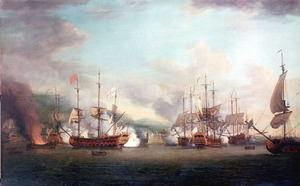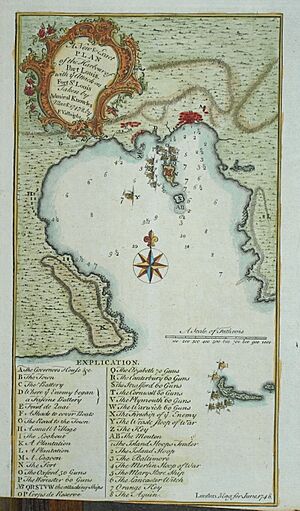Battle of Saint-Louis-du-Sud facts for kids
Quick facts for kids Battle of Saint-Louis-du-Sud |
|||||||
|---|---|---|---|---|---|---|---|
| Part of the War of the Austrian Succession | |||||||
 A painting of the battle by Richard Paton |
|||||||
|
|||||||
| Belligerents | |||||||
| Commanders and leaders | |||||||
| Strength | |||||||
| 9 ships of the line 2 sloops |
310 soldiers | ||||||
| Casualties and losses | |||||||
| 20 killed 50 wounded |
160 killed and wounded 150 captured 4 ships captured |
||||||
The Battle of Saint-Louis-du-Sud, also known as the Battle of Port Louis, was an important fight during the War of the Austrian Succession. It happened on March 22, 1748, in the French colony of Saint Domingue. Today, this place is known as the Republic of Haiti. In this battle, a British navy group led by Admiral Charles Knowles attacked and destroyed a large French fort. The fort was commanded by the French governor, Étienne Cochard de Chastenoye. The British won this battle.
Contents
What Led to the Battle?
A War Across the Seas
Since 1739, Britain had been fighting Spain in the War of Jenkins' Ear. This war was mostly about trade and control in the Americas. Britain had tried to attack Spanish colonies, but they didn't have much success.
Then, the War of the Austrian Succession started in Europe. This bigger war soon spread to the Caribbean Sea. French colonies, like the islands of Guadeloupe, Martinique, and Saint Domingue, became targets. The British Royal Navy kept a close watch on these islands.
Admiral Knowles's Plan
Admiral Charles Knowles was a British naval officer. After serving as governor of Louisbourg, he was promoted. In 1747, he became the commander of the British navy in Jamaica.
Knowles first planned to attack the Spanish city of Santiago de Cuba. But strong winds made it impossible for his ships to sail there. So, he changed his mind. He decided to attack the French Fort Saint Louis de Sud in Saint Domingue instead.
The Battle Begins
A Surprise Attack
On March 22, 1748, shortly before noon, Admiral Knowles led his ships into the harbor of Port Saint Louis. His flagship was HMS Elizabeth. The French defenders were completely surprised by the sudden arrival of the British fleet.
The fort was very strong. It was a large island castle with 78 guns. About 310 French soldiers and a group of black gunners defended it. The fort had thick stone walls, 24 feet high. Governor Étienne Cochard de Chastenoye was in charge of the fort.
Fighting at Close Range
The French guns fired first at 12:05 PM. But Knowles's ships stayed silent. They waited until all of them were in position, very close to the fort's walls. Once they were ready, Knowles ordered his ships to fire all their guns at once. This was called a "volley of broadsides."
For the next three hours, the battle was intense. The British ships kept firing heavily at the French fort. The French defenders tried to fight back. They even sent a "fire-ship" (a ship set on fire to burn enemy ships) towards the British. This forced HMS Elizabeth to quickly move out of the way.
French Surrender
However, the other British ships kept up their strong attack. The fort began to crumble under the constant cannon fire. The French guns fired less and less often. Many French guns were destroyed, and many soldiers were hurt or killed.
Governor Chastenoye saw the damage and knew he couldn't win. At 3:00 PM, he sent an officer to talk about surrendering. Knowles made a counteroffer, and the French commander accepted it half an hour later. The French had to give up the fort. The British would then take control of it peacefully.
After the Battle
The Fort is Destroyed
The French soldiers in the fort suffered many losses. About 160 were killed or wounded. The British had fewer casualties, with 19 killed and 50 wounded. According to the surrender terms, the French soldiers were released. They were allowed to march to a nearby town, keeping their weapons. They promised not to fight against the British for a year and a day.
British sailors and marines then entered the fort. They began to take it apart. The British also captured four French ships. Over the next week, the castle was prepared for demolition. It was completely destroyed.
Knowles Moves On
On March 30, Admiral Knowles left Saint-Louis-du-Sud. With this victory, he once again tried to attack Santiago de Cuba. However, this time, the Spanish forces successfully defended their city, and Knowles was repelled.
Images for kids
 | Leon Lynch |
 | Milton P. Webster |
 | Ferdinand Smith |




